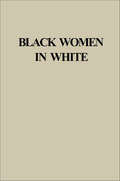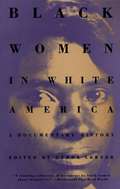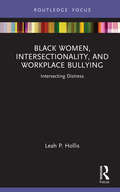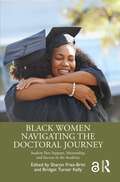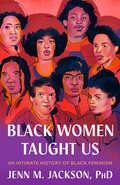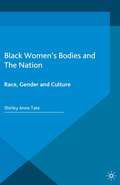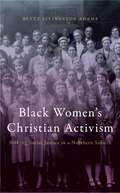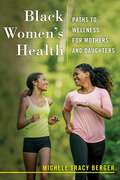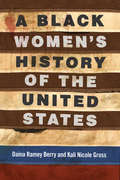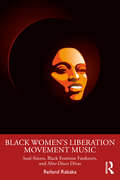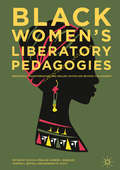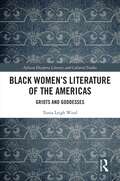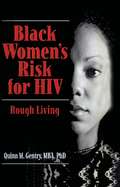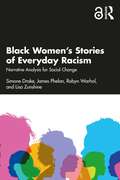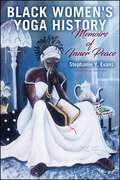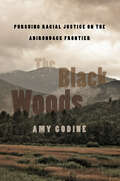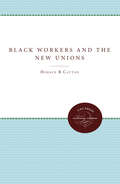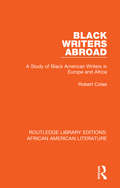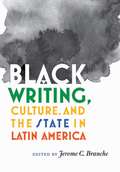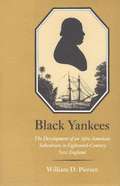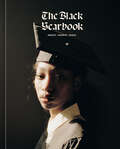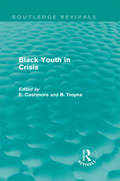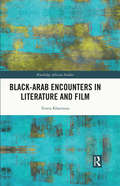- Table View
- List View
Black Women in White: Racial Conflict And Cooperation In The Nursing Profession, 1890-1950 (Blacks in the Diaspora #No.529)
by Darlene Clark Hine" . . . pioneering. . . . This history, as Hine vividly depicts it, sheds light on the development of African-American professionals and offers as well the opportunity to analyze the intersection of race and gender." —The Nation" . . . well-researched and innovative . . . Highly recommended." —Library Journal"The book is full of poignant and sympathetic portraits of black nurses in their dedication and idealism, in their pain and anger at the relentless contempt of white nurses and in their deep concern for their community's health needs. . . . Hine has brilliantly fulfilled an aim other historians have neglected . . . " —The Women's Review of Books"This well-researched book adds breadth and depth to the existing literature on the educational and professional history of black nurses, including the development of black hospitals and training schools in the US. . . . Highly recommended." —Choice" . . . an important book not only because it is a serious effort to analyze nursing history in the context of American racism but also because it offers a vantage point on the experiences of black women at work." —Medical Humanities Review"Darlene Clark Hine has written a thoughtful analysis of the struggles of African Americans striving for professional status and recognition. . . . an illuminating study of the interaction of race and gender in the construction of a professional identity." —The Journal of American HistoryThis pathbreaking study analyzes the impact of racism on the development of the nursing profession, particularly on black women in the profession, during the first half of this century. Hine uncovers shameful episodes in nursing history and probes the nature and extent of racial conflict and cooperation in the profession.
Black Women in White America: A Documentary History
by Gerda LernerThis volume lets black women themselves relate their struggles from the colonial period to the present day.
Black Women, Intersectionality, and Workplace Bullying: Intersecting Distress (Leading Conversations on Black Sexualities and Identities)
by Leah P. HollisBlack Women, Intersectionality, and Workplace Bullying extends and enriches the current literature on workplace bullying by examining specifically how work abuse disproportionality hurts women of color, affecting their mental health negatively and hence their career progression. In this interdisciplinary text, Hollis combines the fields of intersectionality and workplace bullying to present a balanced offering of conceptual essays and empirical research studies. The chapters explore how researchers have previously used empirical studies to address race and gender before arguing that the more complex an identity or intersectional position, such as being a Black gender fluid woman, the more likely a person shall experience workplace bullying. The author also looks at how this affects Black women’s mental health, such as through increased anxiety, depression, insomnia, and self-medicating behaviors, before looking specifically at Black female athletes as a study, the topic of colorism at work and its impact on Black women, and how workplace bullying compromises organizations diversity and inclusion initiatives. This book will be of immense interest to graduate students and academics in the fields of social work, ethnic studies, Black studies, Africana studies, gender studies, political science, sociology, psychology, and social justice. It will also be of interest to those interested in intersectionality and how this relates to race and gender of women.
Black Women Navigating the Doctoral Journey: Student Peer Support, Mentorship, and Success in the Academy
by Sharon Fries-Britt Bridget Turner KellyWith the increasing focus on the critical importance of mentoring in advancing Black women students from graduation to careers in academia, this book identifies and considers the peer mentoring contexts and conditions that support Black women student success in higher education. This edited collection focuses on Black women students primarily at the doctoral level and how they have retained each other through their educational journey, emphasizing how they navigated this season of educational changes given COVID and racial unrest. Chapters illuminate what minoritized women students have done to mentor each other to navigate unwelcome campus environments laden with identity politics and other structural barriers. Shining a light on systemic structures in place that contribute to Black women’s alienation in the academy, this book unpacks implications for interactions and engagement with faculty as advisors and mentors. An important resource for faculty and graduate students at colleges and universities, ultimately this work is critical to helping the academy fortify Black women’s sense of belonging and connection early in their academic career and foster their success.
Black Women Navigating the Doctoral Journey: Student Peer Support, Mentorship, and Success in the Academy
by Sharon Fries-Britt Bridget Turner KellyWith the increasing focus on the critical importance of mentoring in advancing Black women students from graduation to careers in academia, this book identifies and considers the peer mentoring contexts and conditions that support Black women student success in higher education. This edited collection focuses on Black women students primarily at the doctoral level and how they have retained each other through their educational journey, emphasizing how they navigated this season of educational changes given COVID and racial unrest. Chapters illuminate what minoritized women students have done to mentor each other to navigate unwelcome campus environments laden with identity politics and other structural barriers. Shining a light on systemic structures in place that contribute to Black women’s alienation in the academy, this book unpacks implications for interactions and engagement with faculty as advisors and mentors. An important resource for faculty and graduate students at colleges and universities, ultimately this work is critical to helping the academy fortify Black women’s sense of belonging and connection early in their academic career and foster their success.
Black Women Taught Us: An Intimate History of Black Feminism
by Jenn M. JacksonThis is my offering. My love letter to them, and to us. <p> Jenn M. Jackson, PhD, has been known to bring historical acuity to some of the most controversial topics in America today. Now, in their first book, Jackson applies their critical analysis to the questions that have long energized their work: Why has Black women’s freedom fighting been so overlooked throughout history, and what has our society lost because of our refusal to engage with our forestrugglers’ lessons? <p><p> A love letter to those who have been minimized and forgotten, this collection repositions Black women’s intellectual and political work at the center of today’s liberation movements. <p><p> Across eleven original essays that explore the legacy of Black women writers and leaders—from Harriet Jacobs and Ida B. Wells to the Combahee River Collective and Audre Lorde—Jackson sets the record straight about Black women’s longtime movement organizing, theorizing, and coalition building in the name of racial, gender, and sexual justice in the United States and abroad. These essays show, in both critical and deeply personal terms, how Black women have been at the center of modern liberation movements despite the erasure and misrecognition of their efforts. Jackson illustrates how Black women have frequently done the work of liberation at great risk to their lives and livelihoods. <p><p> For a new generation of movement organizers and co-strugglers, Black Women Taught Us serves as a reminder that Black women were the first ones to teach us how to fight racism, how to name that fight, and how to imagine a more just world for everyone.
Black Women's Bodies and The Nation: Race, Gender and Culture (Genders and Sexualities in the Social Sciences)
by S. TateBlack Women's Bodies and the Nation develops a decolonial approach to representations of iconic Black women's bodies within popular culture in the US, UK and the Caribbean and the racialization and affective load of muscle, bone, fat and skin through the trope of the subaltern figure of the Sable-Saffron Venus as an 'alter/native- body'.
Black Women’s Christian Activism: Seeking Social Justice in a Northern Suburb (Social Transformations)
by Betty Livingston Adams2017 Wilbur Non-Fiction Award RecipientWinner of the 2018 Author's Award in scholarly non-fiction, presented by the New Jersey Studies Academic Alliance Winner, 2020 Kornitzer Book Prize, given by Drew UniversityExamines the oft overlooked role of non-elite black women in the growth of northern suburbs and American Protestantism in the first half of the twentieth centuryWhen a domestic servant named Violet Johnson moved to the affluent white suburb of Summit, New Jersey in 1897, she became one of just barely a hundred black residents in the town of six thousand. In this avowedly liberal Protestant community, the very definition of “the suburbs” depended on observance of unmarked and fluctuating race and class barriers. But Johnson did not intend to accept the status quo. Establishing a Baptist church a year later, a seemingly moderate act that would have implications far beyond weekly worship, Johnson challenged assumptions of gender and race, advocating for a politics of civic righteousness that would grant African Americans an equal place in a Christian nation. Johnson’s story is powerful, but she was just one among the many working-class activists integral to the budding days of the civil rights movement.Focusing on the strategies and organizational models church women employed in the fight for social justice, Adams tracks the Intersectionsof politics and religion, race and gender, and place and space in a New York City suburb, a local example that offers new insights on northern racial oppression and civil rights protest. As this book makes clear, religion made a key difference in the lives and activism of ordinary black women who lived, worked, and worshiped on the margin during this tumultuous time.
Black Women's Health: Paths to Wellness for Mothers and Daughters
by Michele Tracy BergerThe struggles African American women and their adolescent daughters face in living healthy, active livesFrom heart disease and diabetes to HIV and obesity, Black women and girls face serious health risks, lagging behind their white counterparts by every measure of health, well-being, and fitness. In Black Women’s Health, Michele Tracy Berger shows us why this is the case, exploring how the health needs of Black women and girls are uniquely rooted in their experiences with racism, sexism, and class discrimination. Drawing on interviews with mothers and their daughters, as well as compelling medical data, Berger provides insight into the larger patterns that place Black women at such high risk on a national level. She shows how Black mothers communicate with their daughters about health, sexuality, and intimacy, including how they attempt to promote healthy living standards even as they navigate widespread, systemic challenges. Ultimately, Berger highlights the important role that family—and specifically, the relationship between mothers and daughters—plays in improving public health outcomes. Black Women’s Health takes a much-needed, intimate look at how Black women and girls navigate different paths to wellness.
A Black Women's History of the United States (REVISIONING HISTORY #5)
by Daina Ramey Berry Kali Nicole GrossA vibrant and empowering history that emphasizes the perspectives and stories of African American women to show how they are--and have always been--instrumental in shaping our country <P><P>In centering Black women's stories, two award-winning historians seek both to empower African American women and to show their allies that Black women's unique ability to make their own communities while combatting centuries of oppression is an essential component in our continued resistance to systemic racism and sexism. Daina Ramey Berry and Kali Nicole Gross offer an examination and celebration of Black womanhood, beginning with the first African women who arrived in what became the United States to African American women of today. <P><P>A Black Women's History of the United States reaches far beyond a single narrative to showcase Black women's lives in all their fraught complexities. Berry and Gross prioritize many voices: enslaved women, freedwomen, religious leaders, artists, queer women, activists, and women who lived outside the law. The result is a starting point for exploring Black women's history and a testament to the beauty, richness, rhythm, tragedy, heartbreak, rage, and enduring love that abounds in the spirit of Black women in communities throughout the nation.
Black Women's Liberation Movement Music: Soul Sisters, Black Feminist Funksters, and Afro-Disco Divas
by Reiland RabakaBlack Women’s Liberation Movement Music argues that the Black Women’s Liberation Movement of the mid-to-late 1960s and 1970s was a unique combination of Black political feminism, Black literary feminism, and Black musical feminism, among other forms of Black feminism. This book critically explores the ways the soundtracks of the Black Women’s Liberation Movement often overlapped with those of other 1960s and 1970s social, political, and cultural movements, such as the Black Power Movement, Women’s Liberation Movement, and Sexual Revolution. The soul, funk, and disco music of the Black Women’s Liberation Movement era is simultaneously interpreted as universalist, feminist (in a general sense), and Black female-focused. This music’s incredible ability to be interpreted in so many different ways speaks to the importance and power of Black women’s music and the fact that it has multiple meanings for a multitude of people. Within the worlds of both Black Popular Movement Studies and Black Popular Music Studies there has been a long-standing tendency to almost exclusively associate Black women’s music of the mid-to-late 1960s and 1970s with the Black male-dominated Black Power Movement or the White female-dominated Women’s Liberation Movement. However, this book reveals that much of the soul, funk, and disco performed by Black women was most often the very popular music of a very unpopular and unsung movement: The Black Women’s Liberation Movement. Black Women’s Liberation Movement Music is an invaluable resource for students, teachers, and researchers of Popular Music Studies, American Studies, African American Studies, Critical Race Studies, Gender Studies, and Sexuality Studies.
Black Women's Liberatory Pedagogies: Resistance, Transformation, and Healing Within and Beyond the Academy
by Olivia N. Perlow Durene I. Wheeler Sharon L. Bethea BarBara M. ScottThis interdisciplinary anthology sheds light on the frameworks and lived experiences of Black women educators. Contributors for this anthology submitted works from an array of academic disciplines and learning environments, inviting readers to bear witness to black women faculty's classroom experiences, as well as their pedagogical approaches both inside and outside of the higher education classroom that have fostered transformative teaching-learning environments. Through this multidimensional lens, the editors and contributors view instruction and learning as a political endeavor aimed at changing the way we think about teaching, learning. and praxis.
Black Women’s Literature of the Americas: Griots and Goddesses (Routledge African Diaspora Literary and Cultural Studies)
by Tonia Leigh WindDrawing on a range of historical and literary texts, this book examines how Black women under the yoke of slavery negotiated their sense of belonging and spirituality from a liminal position, stuck between a new life in the Americas, and their connections to their African ancestral roots and a wider diasporic community. The book investigates how Black women in the Spanish-speaking Caribbean, the United States, and Brazil turned to their spiritual beliefs as a tool of resilience and resistance. These “griots” and “goddesses” are forced to negotiate complex issues such as race, gender, identity, maternity, sexuality, and belonging, from a liminal position that looks to both settle roots in a foreign land, and stay connected to ancestors and the Sacred. As these Black female protagonists turn to (re)memory and ancestral knowledge to map their connection with the Divine, they become mediators of worlds, and hybrid griots surpassing temporal and geographical boundaries. With important reflections on Toni Morrison’s Beloved, Dahlma Llanos-Figueroa’s Daughters of the Stone, and Ana Maria Gonçalves’s Um Defeito de Cor, amongst other texts, this book will be of interest to advanced students and researchers of comparative literature, religious studies, gender studies, and African diaspora studies.
Black Women's Risk for HIV: Rough Living
by Quinn GentryAn inside look at the devastating impact of the HIV/AIDS epidemic on poor African American women Black Women&’s Risk for HIV: Rough Living is a valuable look into the structural and behavioral factors in high-risk environments-specifically inner-city neighborhoods like the "Rough" in Atlanta-that
Black Women’s Stories of Everyday Racism: Narrative Analysis for Social Change
by Simone Drake James Phelan Robyn Warhol Lisa ZunshineBlack Women’s Stories of Everyday Racism puts literary narrative theory to work on an urgent real-world problem. The book calls attention to African American women’s everyday experiences with systemic racism and demonstrates how four types of narrative theory can help generate strategies to explain and dismantle that racism. This volume presents fifteen stories told by eight midwestern African American women about their own experiences with casual and structural racism, followed by four detailed narratological analyses of the stories, each representing a different approach to narrative interpretation. The book makes a case for the need to hear the personal stories of these women and others like them as part of a larger effort to counter the systemic racism that prevails in the United States today.Readers will find that the women’s stories offer powerful evidence that African Americans experience racism as an inescapable part of their day-to-day lives—and sometimes as a force that radically changes their lives. The stories provide experience-based demonstrations of how pervasive systemic racism is and how it perpetuates power differentials that are baked into institutions such as schools, law enforcement, the health care system, and business. Containing countless signs of the stress and trauma that accompany and follow from experiences of racism, the stories reveal evidence of the women’s resilience as well as their unending need for it, as they continue to feel the negative effects of experiences that occurred many years ago. The four interpretive chapters note the complex skill involved in the women’s storytelling. The analyses also point to the overall value of telling these stories: how they are sometimes cathartic for the tellers; how they highlight the importance of listening—and the likelihood of misunderstanding—and how, if they and other stories like them were heard more often, they would be a force to counteract the structural racism they so graphically expose.The Open Access version of this book, available at http://www.taylorfrancis.com, has been made available under a Creative Commons Attribution (CC-BY) 4.0 license.
Black Women's Yoga History: Memoirs of Inner Peace (SUNY series in Black Women's Wellness)
by Stephanie Y. EvansHow have Black women elders managed stress? In Black Women's Yoga History, Stephanie Y. Evans uses primary sources to answer that question and to show how meditation and yoga from eras of enslavement, segregation, and migration to the Civil Rights, Black Power, and New Age movements have been in existence all along. Life writings by Harriet Jacobs, Sadie and Bessie Delany, Eartha Kitt, Rosa Parks, Jan Willis, and Tina Turner are only a few examples of personal case studies that are included here, illustrating how these women managed traumatic stress, anxiety, and depression. In more than fifty yoga memoirs, Black women discuss practices of reflection, exercise, movement, stretching, visualization, and chanting for self-care. By unveiling the depth of a struggle for wellness, memoirs offer lessons for those who also struggle to heal from personal, cultural, and structural violence. This intellectual history expands conceptions of yoga and defines inner peace as mental health, healing, and wellness that is both compassionate and political.
The Black Woods: Pursuing Racial Justice on the Adirondack Frontier
by Amy GodineThe Black Woods chronicles the history of Black pioneers in New York's northern wilderness. From the late 1840s into the 1860s, they migrated to the Adirondacks to build farms and to vote. On their new-worked land, they could meet the $250 property requirement New York's constitution imposed on Black voters in 1821, and claim the rights of citizenship. Three thousand Black New Yorkers were gifted with 120,000 acres of Adirondack land by Gerrit Smith, an upstate abolitionist and heir to an immense land fortune. Smith's suffrage-seeking plan was endorsed by Frederick Douglass and most leading Black abolitionists. The antislavery reformer John Brown was such an advocate that in 1849 he moved his family to Timbuctoo, a new Black Adirondack settlement in the woods. Smith's plan was prescient, anticipating Black suffrage reform, affirmative action, environmental distributive justice, and community-based racial equity more than a century before these were points of public policy. But when the response to Smith's offer fell radically short of his high hopes, Smith's zeal cooled. Timbuctoo, Freemen's Home, Blacksville and other settlements were forgotten. History would marginalize this Black community for 150 years. In The Black Woods, Amy Godine recovers a robust history of Black pioneers who carved from the wilderness a future for their families and their civic rights. Her immersive story returns the Black pioneers and their descendants to their rightful place at the center of this history. With stirring accounts of racial justice, and no shortage of heroes, The Black Woods amplifies the unique significance of the Adirondacks in the American imagination.
Black Workers and the New Unions
by George S. Mitchell Horace R. CaytonThis is a book for those who want to know what really happens when, in circumstances of enormous complexity and under the impetus of the New Deal, an irresistible drive for labor organization runs head-on into an immovably imbedded race prejudice. It is based on interviews by the authors with those people most intimately concerned.Originally published in 1939.A UNC Press Enduring Edition -- UNC Press Enduring Editions use the latest in digital technology to make available again books from our distinguished backlist that were previously out of print. These editions are published unaltered from the original, and are presented in affordable paperback formats, bringing readers both historical and cultural value.
Black Writers Abroad: A Study of Black American Writers in Europe and Africa (Routledge Library Editions: African American Literature #3)
by Robert ColesOriginally published in 1999 Black Writers Abroad puts forward the theory that African American literature was born, partially within the context of a people and its writers who lived, for the most part, in slavery and bondage prior to the Civil War. It is an in-depth study of black American writers who, left the United States as expatriates. The book discusses the people that left, where they went, why they left and why they did or did not return, from the nineteenth century to the twentieth century. It seeks to explain the impact exile had upon these authors’ literary work and careers, as well as upon African American literary history.
Black Writing, Culture, and the State in Latin America
by Jerome BrancheImagine the tension that existed between the emerging nations and governments throughout the Latin American world and the cultural life of former enslaved Africans and their descendants. A world of cultural production, in the form of literature, poetry, art, music, and eventually film, would often simultaneously contravene or cooperate with the newly established order of Latin American nations negotiating independence and a new political and cultural balance. In Black Writing, Culture, and the State in Latin America, Jerome Branche presents the reader with the complex landscape of art and literature among Afro-Hispanic and Latin artists. Branche and his contributors describe individuals such as Juan Francisco Manzano, who wrote an autobiography on the slave experience in Cuba during the nineteenth century. The reader finds a thriving Afro-Hispanic theatrical presence throughout Latin America and even across the Atlantic. The role of black women in poetry and literature comes to the forefront in the Caribbean, presenting a powerful reminder of the diversity that defines the region. All too often, the disciplines of film studies, literary criticism, and art history ignore the opportunity to collaborate in a dialogue. Branche and his contributors present a unified approach, however, suggesting that cultural production should not be viewed narrowly, especially when studying the achievements of the Afro-Latin world.
Black Writing, Culture, and the State in Latin America
by Jerome C. BrancheImagine the tension that existed between the emerging nations and governments throughout the Latin American world and the cultural life of former enslaved Africans and their descendants. A world of cultural production, in the form of literature, poetry, art, music, and eventually film, would often simultaneously contravene or cooperate with the newly established order of Latin American nations negotiating independence and a new political and cultural balance. In Black Writing, Culture, and the State in Latin America, Jerome Branche presents the reader with the complex landscape of art and literature among Afro-Hispanic and Latin artists. Branche and his contributors describe individuals such as Juan Francisco Manzano, who wrote an autobiography on the slave experience in Cuba during the nineteenth century. The reader finds a thriving Afro-Hispanic theatrical presence throughout Latin America and even across the Atlantic. The role of black women in poetry and literature comes to the forefront in the Caribbean, presenting a powerful reminder of the diversity that defines the region.All too often, the disciplines of film studies, literary criticism, and art history ignore the opportunity to collaborate in a dialogue. Branche and his contributors present a unified approach, however, suggesting that cultural production should not be viewed narrowly, especially when studying the achievements of the Afro-Latin world.
Black Yankees: The Development Of An Afro-american Subculture In Eighteenth-century New England
by William D. PiersenThis book examines the development of an Afro-American subculture in eighteenth-century New England. Piersen concerns himself not with the machinery of slave control or the political and social disabilities of bondage, but with the processes of cultural change and creation from the black bondsman's point of view. What was it like to be an African immigrant in colonial New England? What attitudes and assumptions underlay the Afro-American response to Yankee culture? What does the development within the confines of a predominantly white and ethnocentric New England of an Afro-American folk culture in religion, public rituals, folk arts and crafts, social mores, and daily behavior say about the creation of American culture? On the face of it, the master class called the tunes and slaves danced the beat. Blacks who were taken into New England's bondage were clearly engulfed in a pervasive, narrow-minded Euro-American society that had no interest in fostering Afro-American autonomy. The New England experience was often cruel, and the numbers alone suggest it was among the most unequal of black/white cultural contacts in the New World. Nonetheless, despite the strictures of bondage, the black Yankees of eighteenth-century New England created a sustaining folk culture of their own.
The Black Yearbook [Portraits and Stories]
by Adraint Khadafhi BerealA gripping exploration of the joys, hardships, and truths of Black students through intimate, honest dialogues and stunning photography, with a foreword by Kiese Laymon, author of Heavy&“A radical, reverential, and restorative document of community.&”—Rebecca Bengal, author of Strange Hours: Photography, Memory, and the Lives of ArtistsWhen photographer Adraint Bereal graduated from the University of Texas, he self-published an impressive volume of portraits, personal statements, and interviews that explored UT's campus culture and offered an intimate look at the lives of Black students matriculating within a majority white space. Bereal's work was inspired by his first photo exhibition at the George Washington Carver Museum in Austin, entitled 1.7, that unearthed the experiences of the 925 Black men that made up just 1.7% of UT's total 52,000 student body.Now Bereal expands the scope of his original project and visits colleges nationwide, from Historically Black Colleges and Universities (HBCUs) to predominantly white institutions to trade schools and more. Rather than dwelling on the monolith of trauma often associated with Black narratives, Bereal is dedicated to using honest dialogue to share stories of true joy and triumph amidst the hardships, prejudices, and internal struggles. Using an exciting and eclectic design approach to accompany the portraits and stories, each individual profile effectively conveys the interviewee's unique voice, tone, and background.The Black Yearbook reframes society's stereotypical perception of higher education by representing and celebrating the wide range of Black experiences on campuses.
Black Youth in Crisis (Routledge Revivals)
by E. Cashmore and B. TroynaFirst published in 1982, this book considers the position of young Afro-Caribbean people in Britain, in the 1980s. It looks at how, at the time, this group of young people were disproportionately hit by growing unemployment, seemed to be over-represented in crime statistics and were often disadvantage at school. The authors of the book analyse the struggles of the time and look at the reasons for their existence.
Black–Arab Encounters in Literature and Film (Routledge African Studies)
by Touria KhannousThis book investigates how representations of Black Africans have been negotiated over time in Arabic literature and film. The book offers direct readings of a representative selection of primary texts, shedding light on the divergent ways these authors understood race across different genres, including pre-Islamic classical poetry, polemical essays, travel narratives, novels, and films. Starting with the first recognized Black-Arab poet Antara Ibn Shaddad (580 C.E.) and extending right up to the present day, the works examined illuminate the changes in consciousness that attended Black Africans as they negotiated their position in Arab society. In a twist to Edward Said’s Orientalism, the book argues that scholars in the Middle East and North Africa generated a hierarchical representational discourse themselves, one equally predicated on the Self-Other binary. However, it also demonstrates that Arab racial discourse is not a linear rhetoric but changes according to history, political circumstances, and ideologies such as tribal politics, the Shu’ubiyya movement, nationalism, and imperialism. Blacks and Arabs have had tangled relationships that are based not only on race but also on kinship and solidarity due to trade and other types of connections. Challenging fundamental assumptions of Black Diaspora studies and postcolonial studies, this book will be of interest to scholars of the African diaspora, Arabic literature, Middle East studies, and critical race studies.
